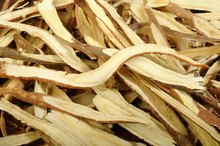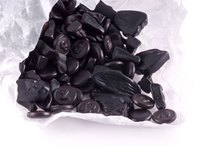What does fact checked mean?
At Healthfully, we strive to deliver objective content that is accurate and up-to-date. Our team periodically reviews articles in order to ensure content quality. The sources cited below consist of evidence from peer-reviewed journals, prominent medical organizations, academic associations, and government data.
The information contained on this site is for informational purposes only, and should not be used as a substitute for the advice of a professional health care provider. Please check with the appropriate physician regarding health questions and concerns. Although we strive to deliver accurate and up-to-date information, no guarantee to that effect is made.
Licorice for Gastritis
Gastritis is a condition that can cause significant pain. There are both over-the-counter and prescription medications to treat gastritis, but some people may find relief in using herbs. Licorice is an herb that can help ease symptoms of the condition. Before using licorice for this purpose, talk with your doctor to make sure it is safe and appropriate for you to use.
If you are experiencing serious medical symptoms, seek emergency treatment immediately.
Gastritis
When the mucosa, or stomach lining, becomes inflamed, this is a condition called gastritis. This condition can be acute or chronic, and can be caused by H.pylori infection, long-term use of non-steroidal anti-inflammatory drugs, or NSAIDs, radiation therapy or serious illness, says the National Digestive Diseases Information Clearinghouse.cause:
- This condition can be acute or chronic,
- can be caused by H.pylori infection
- long-term use of non-steroidal anti-inflammatory drugs
- or NSAIDs
- radiation therapy or serious illness
- says the National Digestive Diseases Information Clearinghouse
Sometimes the stomach lining has been eroded, causing gastric ulcers. Though some individuals may be asymptomatic, symptoms of gastritis can include upper abdominal pain, nausea, vomiting and blood in the stool. After appropriate diagnosis by a health care professional, treatment may consist of antacids, proton pump inhibitor drugs or histamine 2 blockers to help decrease stomach acid.
- When the mucosa, or stomach lining, becomes inflamed, this is a condition called gastritis.
- Though some individuals may be asymptomatic, symptoms of gastritis can include upper abdominal pain, nausea, vomiting and blood in the stool.
Licorice
The Best Herbs for Treating Stomach Ulcers
Learn More
The herb form of licorice, not the black or red stringy candy, can be used for both food and medicinal purposes. If you use licorice, it is important to get deglycyrrhizinated licorice, or DGL. Too much glycyrrhizin can cause serious adverse side effects, and DGL may be easier on the stomach, states the University of Maryland. Individuals with certain medical conditions should not take licorice, so ask your physician if these supplements are safe for you prior to consuming them.
- The herb form of licorice, not the black or red stringy candy, can be used for both food and medicinal purposes.
- Too much glycyrrhizin can cause serious adverse side effects, and DGL may be easier on the stomach, states the University of Maryland.
Taking Licorice for Gastritis
Licorice can help prevent gastritis by reducing the risk of irritation to the mucosa, and it may help in healing the mucosa, relieving symptoms of gastritis. The University of Maryland Medical Center suggests taking 250 to 500 mg of standardized DGL extract, 3 times a day, an hour before meals or 2 hours post-meal 12. This can help protect your mucosa from damage caused by NSAIDs. It can also help treat any ulcers you may have that are caused by the gastritis. Do not use licorice for more than a week without consulting your health care provider, as adverse effects can occur with longer use.
- Licorice can help prevent gastritis by reducing the risk of irritation to the mucosa, and it may help in healing the mucosa, relieving symptoms of gastritis.
Considerations
Natural Alternatives to Nexium
Learn More
If you have gastritis, talk with your doctor about your treatment options and what might work best for your situation. Tell your doctor about any other medications or supplements you are taking, to avoid any adverse interactions with the licorice. If your symptoms of gastritis do not improve or get worse, call your doctor immediately.
Related Articles
References
- University of Maryland Medical Center; Licorice; Dr. Steven Ehrlich; March 2010
- University of Maryland Medical Center; Gastritis; Dr. Steven Ehrlich; September 2009
- National Institute of Diabetes and Digestive and Kidney Diseases. Definition & Facts for Gastritis & Gastropathy. Updated August 2019.
- National Institute of Diabetes and Digestive and Kidney Diseases. Symptoms & Causes of Gastritis & Gastropathy. Updated August 2019.
- National Institute of Diabetes and Digestive and Kidney Diseases. Symptoms & Causes of Peptic Ulcers (Stomach Ulcers). Updated November 2014.
- Office on Women's Health. Iron-deficiency anemia. Updated April, 1, 2019.
- Sipponen P, Maaroos HI. Chronic gastritis. Scand J Gastroenterol. 2015;50(6):657–667. doi:10.3109/00365521.2015.1019918
- National Institute of Diabetes and Digestive and Kidney Diseases. Upper GI Endoscopy. Updated July 2017.
- Johnson LE. Vitamin B12 Deficiency. Merck Manual Professional Version. Updated August 2019.
- Johns Hopkins University. Upper Gastrointestinal Series.
- American Society for Gastrointestinal Endoscopy. Understanding Upper Endoscopy.
- Mounsey A, Leonard EA. Noninvasive Diagnostic Tests for Helicobacter pylori Infection. Am Fam Physician. 2019;100(1):16-17.
- Sweis RN, Jivan A. Overview of Acute Coronary Syndromes (ACS). Merck Manual Professional Version. Updated December 2018.
- Fashner J, Gitu AC. Diagnosis and Treatment of Peptic Ulcer Disease and H. pylori Infection. Am Fam Physician. 2015;91(4):236-242.
- Yucel O. Prevention of Helicobacter pylori infection in childhood. World J Gastroenterol. 2014;20(30):10348-1054. doi:10.3748/wjg.v20.i30.10348
Writer Bio
Jaime Herndon has been writing for health websites since 2009 and has guest-blogged on SheKnows. After graduating with a Bachelor of Arts in psychology and women's studies, she earned a Master of Science in clinical health psychology and a Master of Public Health in maternal-child health. Her interests include oncology, women's health and exercise science.









